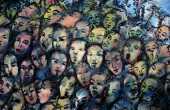Lauren Mead
I write short fiction and middle-grade novels. When I am not writing, I am reading voraciously and teaching English lit.
Contributor I
- Lurker
- Pssst
- Sharp-Eyed Citizen
- ?
- Articles
2 - Featured
1 - Comments
113
- Ext. Comments
21 - Processed
11 - Revisions
9
- Topics
4 - Topics Taken
2 - Notes
8
- Topics Proc.
9 - Topics Rev.
0
- Points
579 - Rank
172 - Score
411
Latest Articles
Latest Topics
The Evolution of the TV SitcomFrom I Dream of Jeannie and Bewitched to Seinfeld and FRIENDS to How I Met Your Mother (among many, many others), the sitcom has its own history in television. It would be interesting to do a study on sitcoms, focusing on how sitcoms over the decades have also been shaped by the sociocultural underpinnings of that era.
|
Published and IncompleteExplore the trend of famous authors' first drafts and unfinished novels being published. Should authors publish these unfinished works? Or does it take away from the canon of their own literature?
|
Blogging: Help or Hinderance in Building a Writing Career?Many writing help sites suggest that starting a blog can launch your writing career. Others suggest that spending too much time tending a blog can stunt your literary growth in terms of productivity. So where do you draw the line? Is there a way to manage both or should a fledgling writer focus solely on writing the stories they want to write?
|
How We Read: Various Ways of Engaging With and Interpreting TextsAs a teacher, I often hear about the diverse ways that people learn. I.e. some people are better at learning by listening, while others need to see the lesson in writing or experience it on a more kinetic level. In what ways do we engage with a story differently when it is in audiobook form vs. paper format?
|
Latest Comments
| Creating a Writing Habit that Works: Muses, Magic and Faith | |
Hi Candice, I couldn’t agree more. The more you write, the more you will discover about your writing practice. I also find that I have more ideas when I write more regularly. | Creating a Writing Habit that Works: Muses, Magic and Faith |
Cin, I know what you mean about in-the-mood writing bursts! I think those are great too. | Creating a Writing Habit that Works: Muses, Magic and Faith |
Thanks Stephanie! | Creating a Writing Habit that Works: Muses, Magic and Faith |
Hi Joseph, it’s true that sometimes jumping into a conversation can spark inspiration. Happy writing! | Creating a Writing Habit that Works: Muses, Magic and Faith |
Hi Melver, that sounds like a great idea 🙂 | Creating a Writing Habit that Works: Muses, Magic and Faith |
Thanks sophiawestover! Happy writing! | Creating a Writing Habit that Works: Muses, Magic and Faith |
Thank you so much! I’m so glad that my article helped. Happy writing! | Creating a Writing Habit that Works: Muses, Magic and Faith |


Thanks SophIsticated! Sometimes I think that the time I spend letting my mind wander is when I figure out how to continue a narrative that I’m writing. 🙂